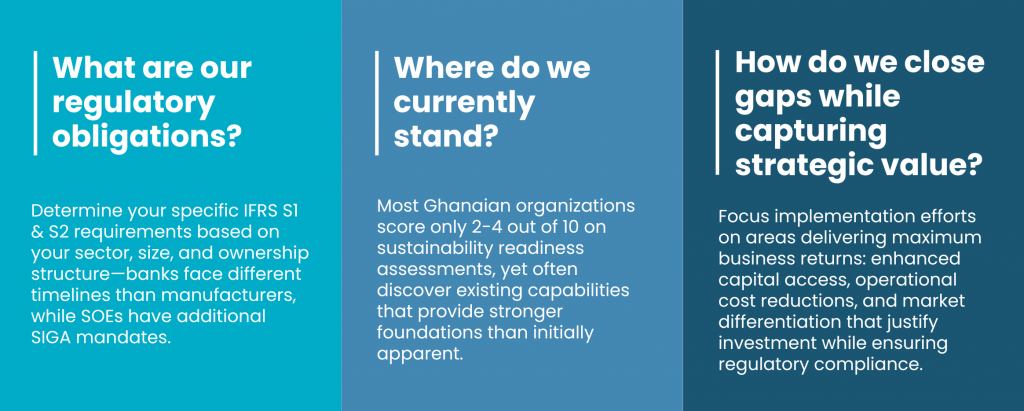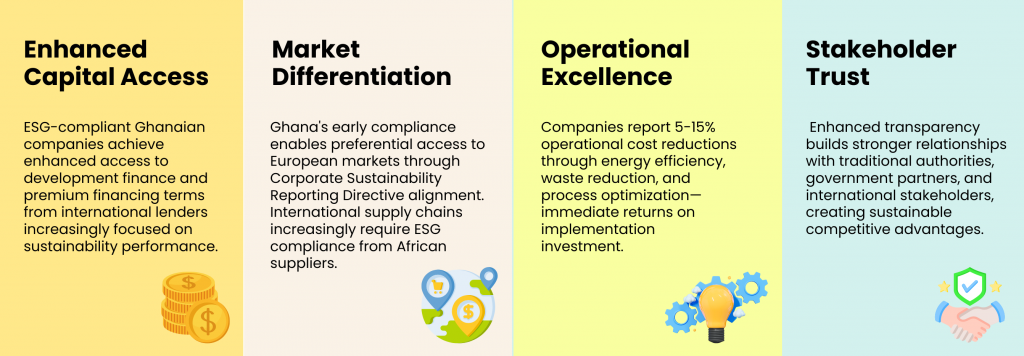
A practical guide for Ghanaian businesses preparing for the 2027 implementation deadline
Time is running out. The countdown has begun for Ghana’s most significant companies and institutions. With just 18 months until mandatory IFRS S1 & S2 implementation, organizations across Ghana’s key sectors face an urgent deadline that will fundamentally reshape how they access capital, compete internationally, and demonstrate value to stakeholders.
ESG-compliant Ghanaian companies are already achieving 0.25-0.75% better financing terms and 25-40% enhanced access to development finance. For a company with GH¢100 million in debt, this translates to annual savings of GH¢250,000-750,000. Early adopters report 5-15% operational cost reductions through efficiency improvements while securing preferential access to European markets and the $2+ trillion global ESG investor base.
But the window is closing fast. The Institute of Chartered Accountants Ghana (ICAG) has established clear enforcement frameworks including professional sanctions, while the Securities and Exchange Commission can impose market penalties including warnings, fines, and potential delisting. International investors increasingly exclude non-compliant African companies from investment portfolios. Organizations that delay face a triple threat: regulatory penalties, financing exclusion, and competitive disadvantage as early movers capture market advantages.
IFRS S1 sets general requirements for sustainability disclosure across governance, strategy, risk management, and metrics—covering any sustainability factor that could affect business value. IFRS S2 focuses specifically on climate-related risks and opportunities, requiring greenhouse gas emissions disclosure and climate scenario analysis. Both standards use financial materiality: disclose issues that matter most to investors, lenders, and regulators.
Immediate Mandatory Compliance (January 1, 2027):
Phase II (Jan 2028) will expand this list.
The State Interests and Governance Authority (SIGA) has been particularly aggressive, requiring comprehensive sustainability disclosure policies across Ghana’s SOE portfolio immediately.
IFRS S1 & S2 can appear overwhelmingly complex—governance structures, materiality assessments, climate scenario analysis, and comprehensive stakeholder engagement. However, successful implementation requires strategic thinking, not technical perfectionism.
The Strategic Implementation Framework:
Rather than attempting to master every requirement immediately, smart organizations start with three questions that transform compliance from burden into competitive advantage:


SIGA’s coordination across entities like Ghana National Petroleum Corporation, Electricity Company of Ghana, Volta River Authority, and SSNIT demonstrates how systematic capability building enhances public accountability while creating operational excellence and improved development finance access. This transforms sustainability reporting from compliance burden into governance improvement that strengthens public trust and positions Ghanaian SOEs as continental leaders.
Organizations delaying implementation face escalating consequences:
Organizations beginning implementation now capture maximum advantage from Ghana’s continental leadership while avoiding costly last-minute scrambles. Your immediate next step: conduct a comprehensive readiness assessment using the simple three-question framework to determine regulatory requirements, identify gaps, and develop plans that transform compliance into competitive advantage.
Don’t wait for regulatory pressure to force action. Organizations demonstrating early leadership are already securing better financing terms, accessing premium markets, and building stakeholder relationships that create lasting competitive advantages.

Ghana has a continental head start. Whether your organization uses it to lead—or waits until regulations force action—will define your competitiveness for the next decade.
For detailed implementation guidance, access Prof. Dunn’s comprehensive IFRS S1 & S2 Implementation and Reporting Research Report at https://bit.ly/IFRS-Africa
Prof. Wayne Dunn is President & Founder of the CSR|ESG Training Institute and former Professor of Practice in CSR at McGill University. The Institute’s ESG & Sustainable Finance Certified Masterclass takes place September 29-October 2, 2025, in Accra. It will cover IFRS S1 S2